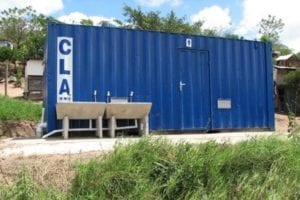KwaZulu-Natal recently showed off some of its alternative sanitation technologies when Minister of Water and Sanitation Nomvula Mokonyane and Deputy Minister Pamela Tshwete embarked on a tour to explore the various methods used by locals to better the conditions of sanitation services in the area.
The tour, which formed part of the Sanitation Week celebrations, kicked off with a visit to the Besters Pit Emptying Project at the Besters informal settlement. Here employed members of the community are trained in health and safety to manually remove human waste and waste water from Ventilated Improved Pit Latrines (VIPs). This is done to minimise the risk of spreading sanitation related diseases. Dumisani Majozi of Abaphumeleli Trading 1133 CC, a company contracted by the eThekwini Municipality to carry out the project, said that since they became part of the intervention in 2008 they have not encountered any incidents related to the health of the employees. This is as a result of the health training and injections, to prevent illnesses such as Typhoid and Hepatitis B, staff receive before they start working on site. Minister Mokonyane, who believes that decent sanitation is not about having a toilet that flushes or require the use of water, commended the eThekwini Municipality for the initiative and encouraged community members to work together with the Municipality by taking care of the facilities and avoid throwing alien objects into them as that could compromise the safety and sustainability of the infrastructure.








